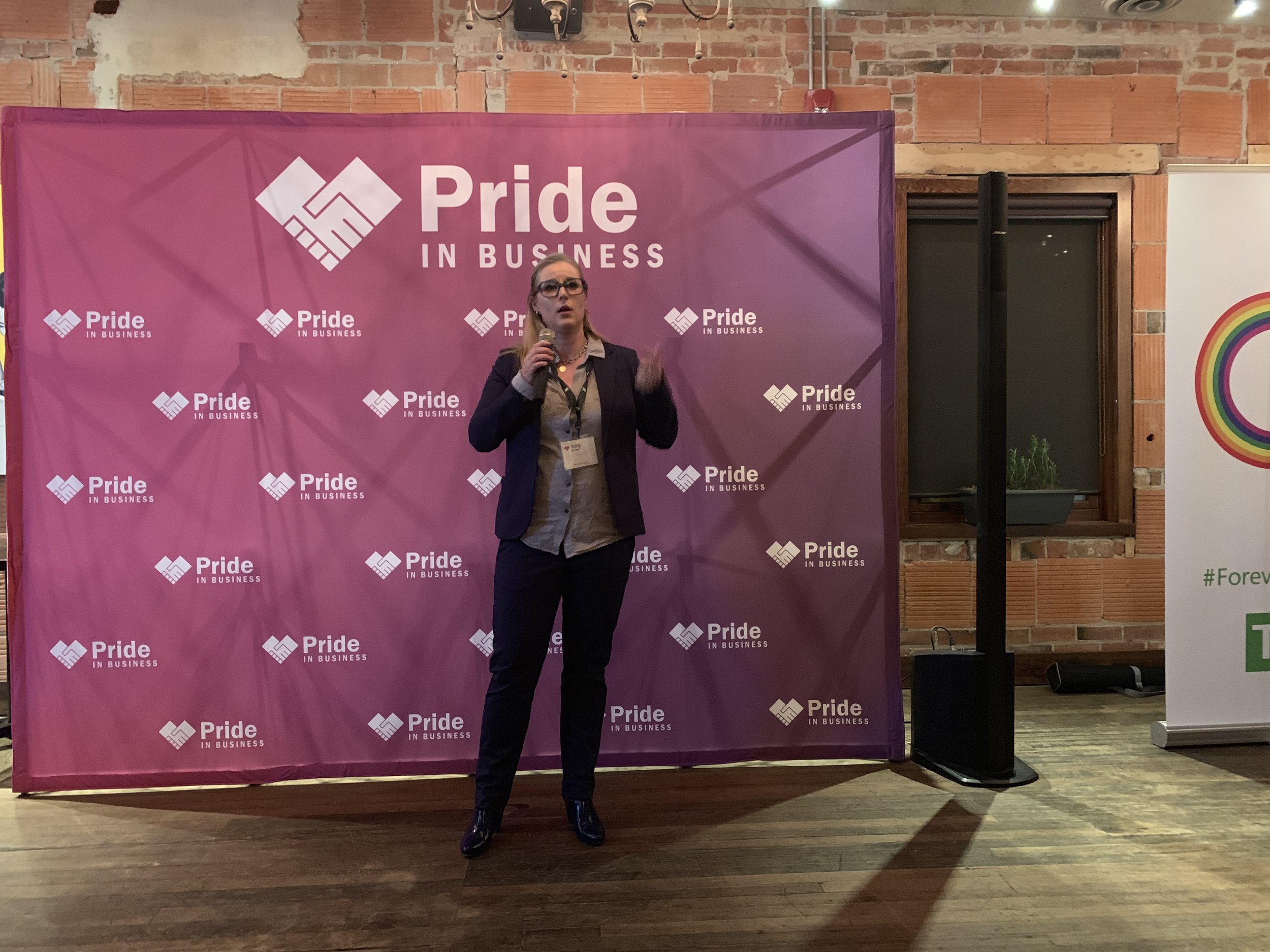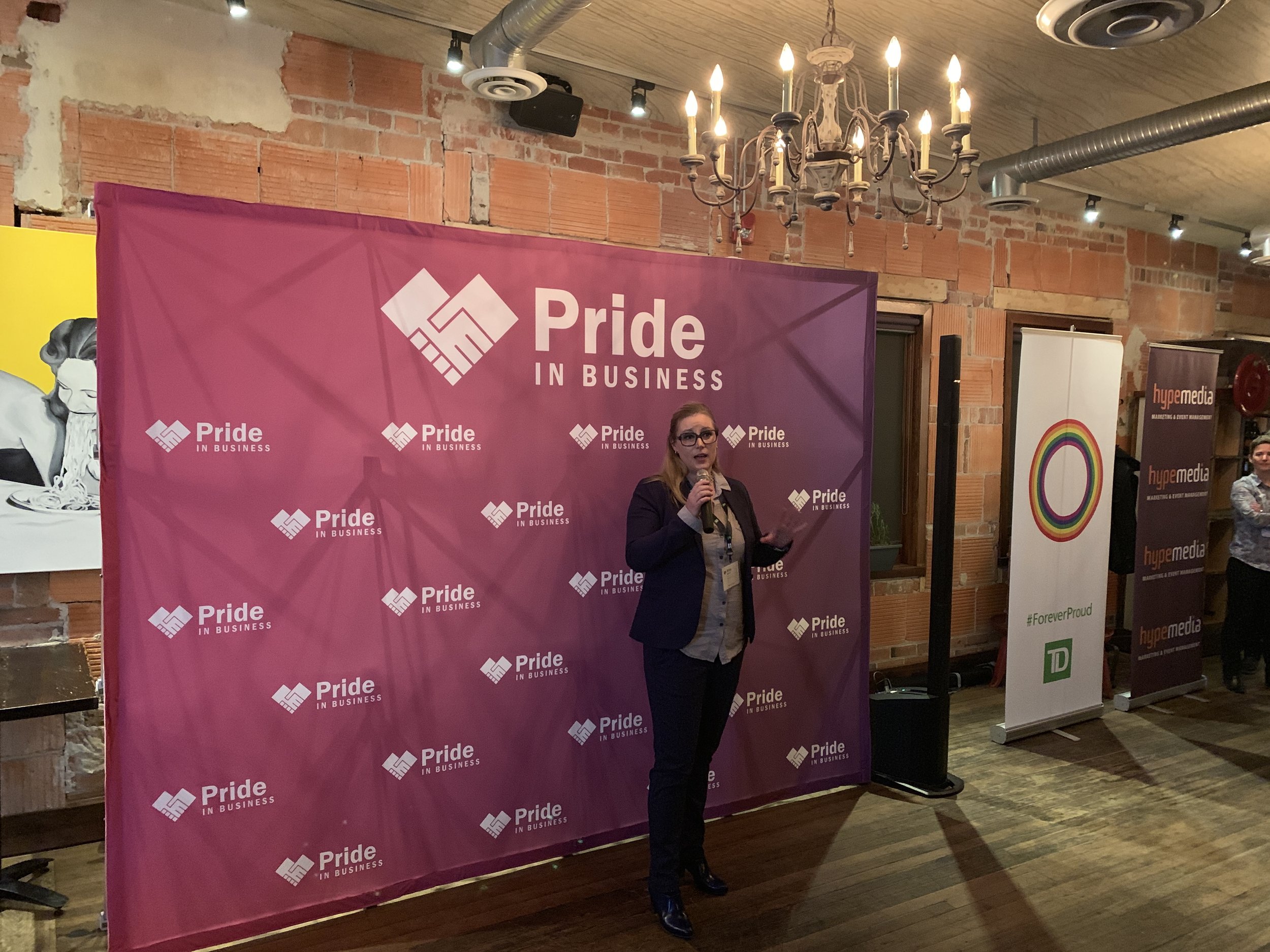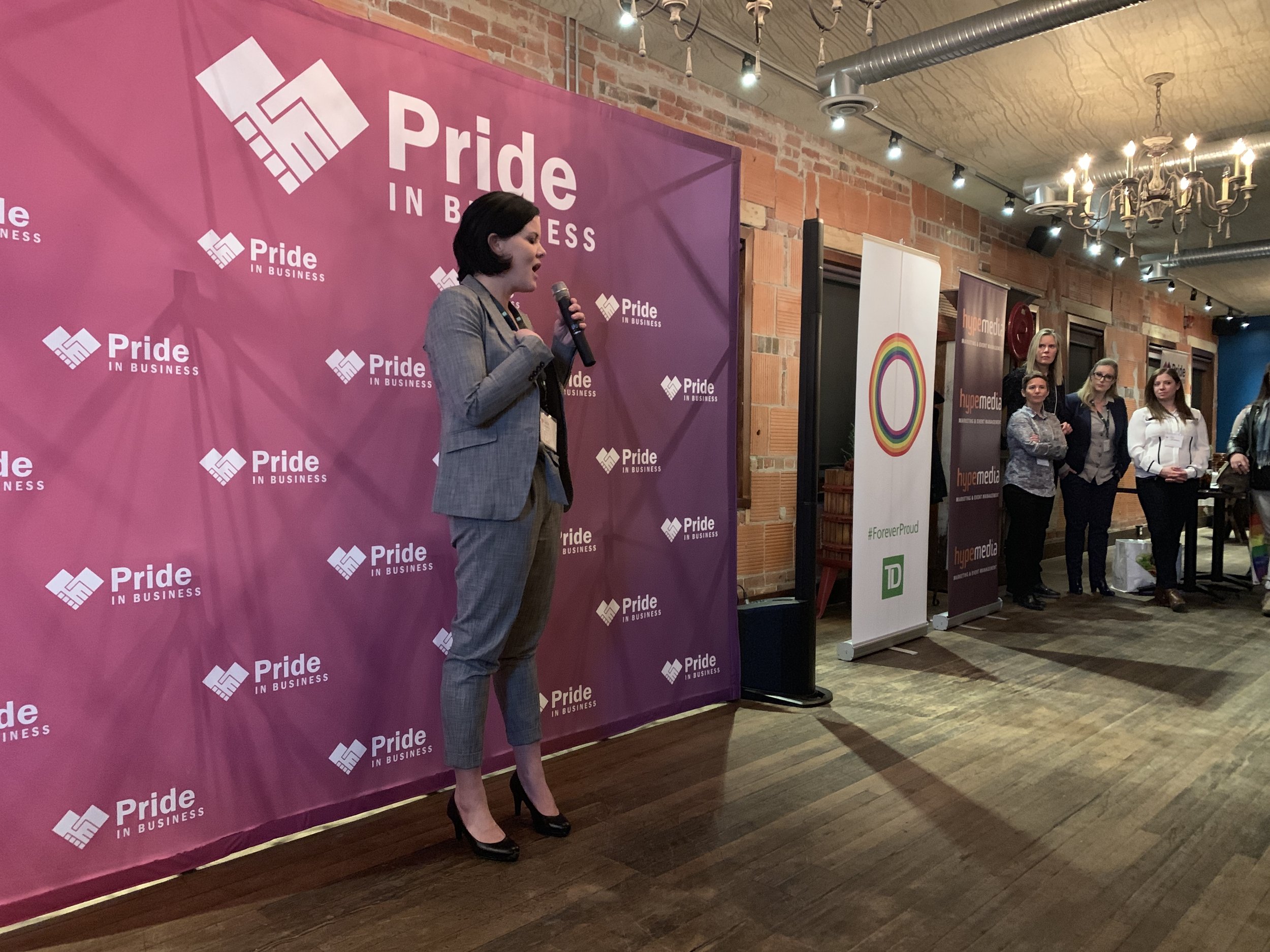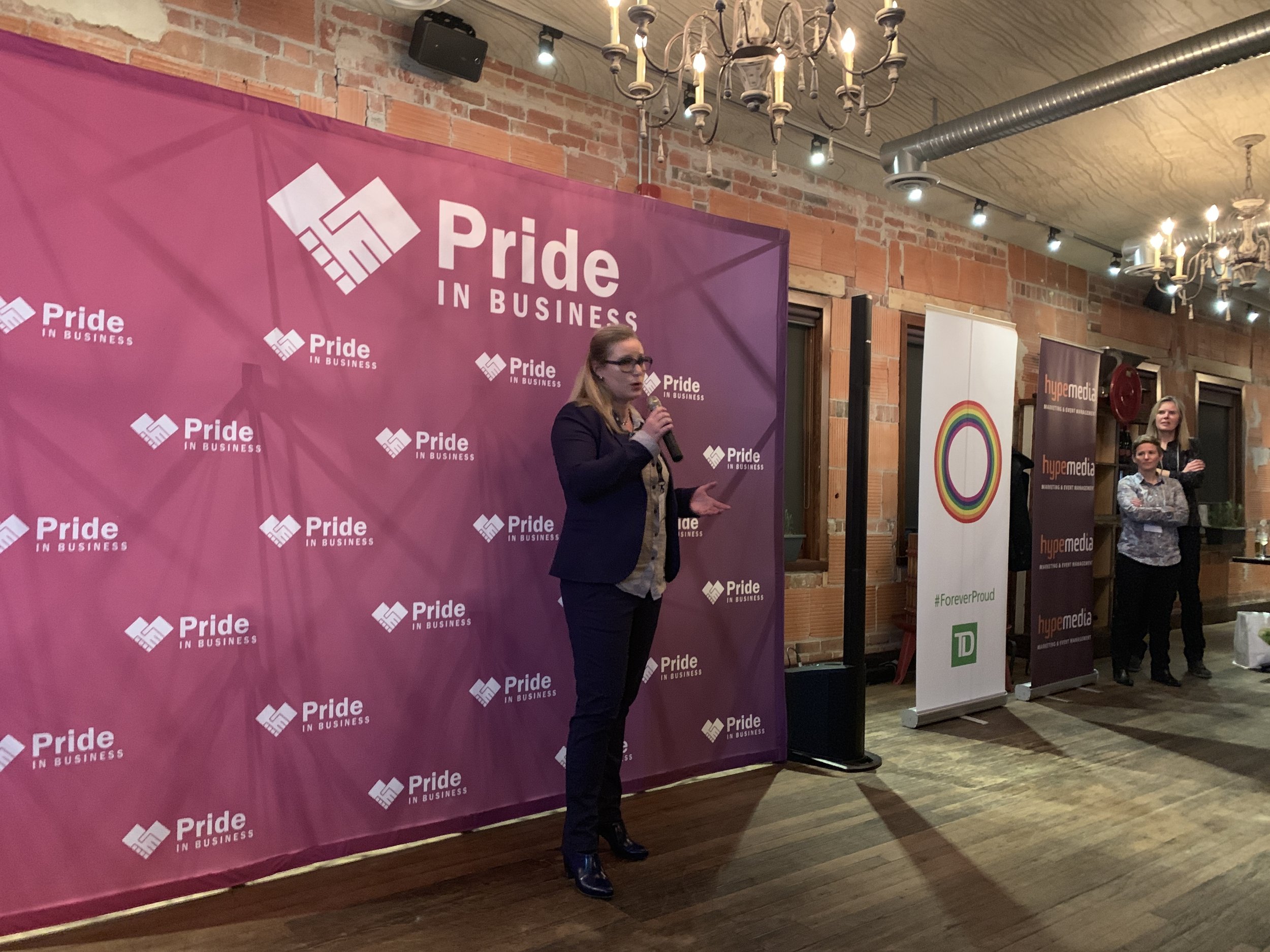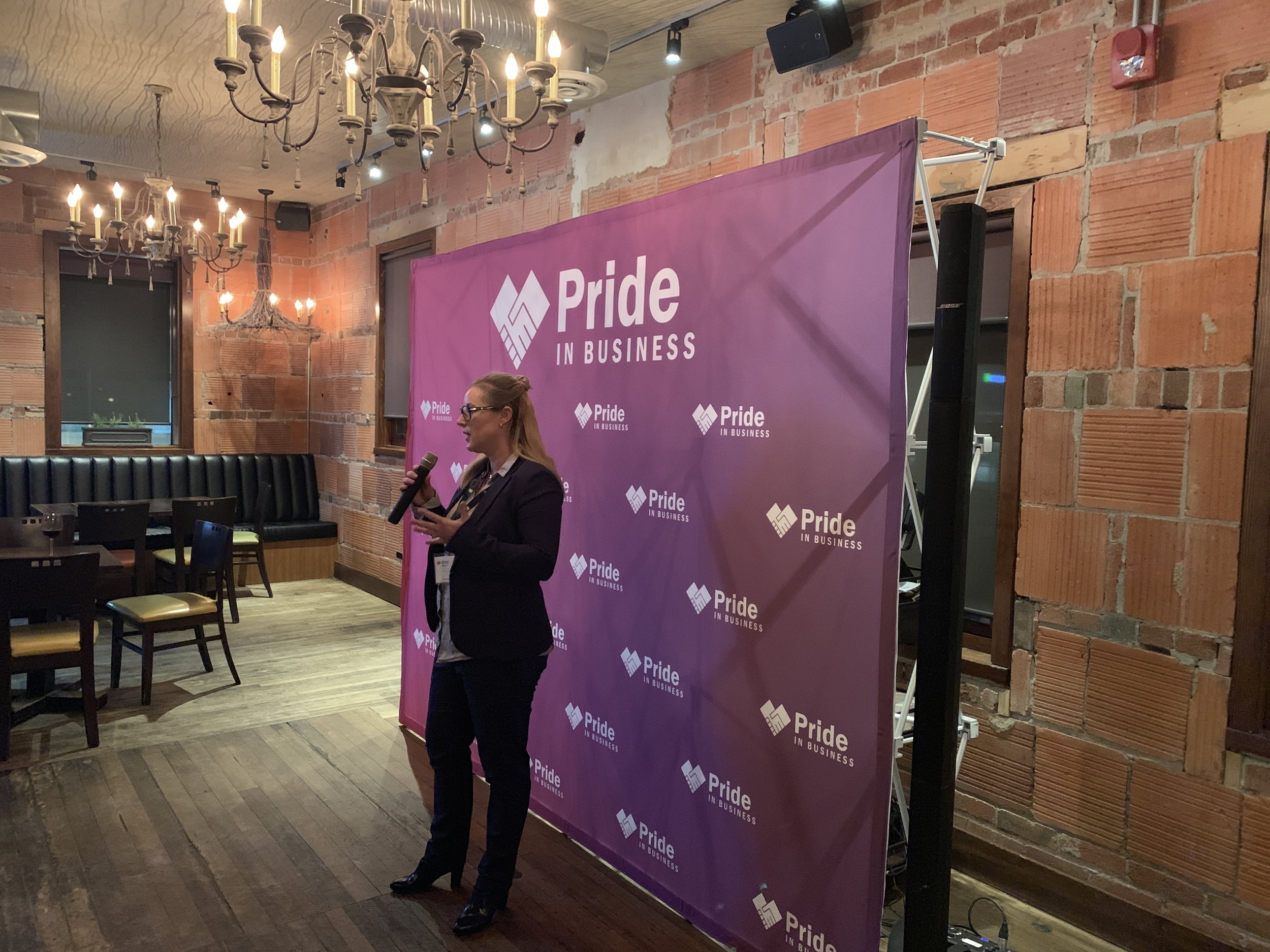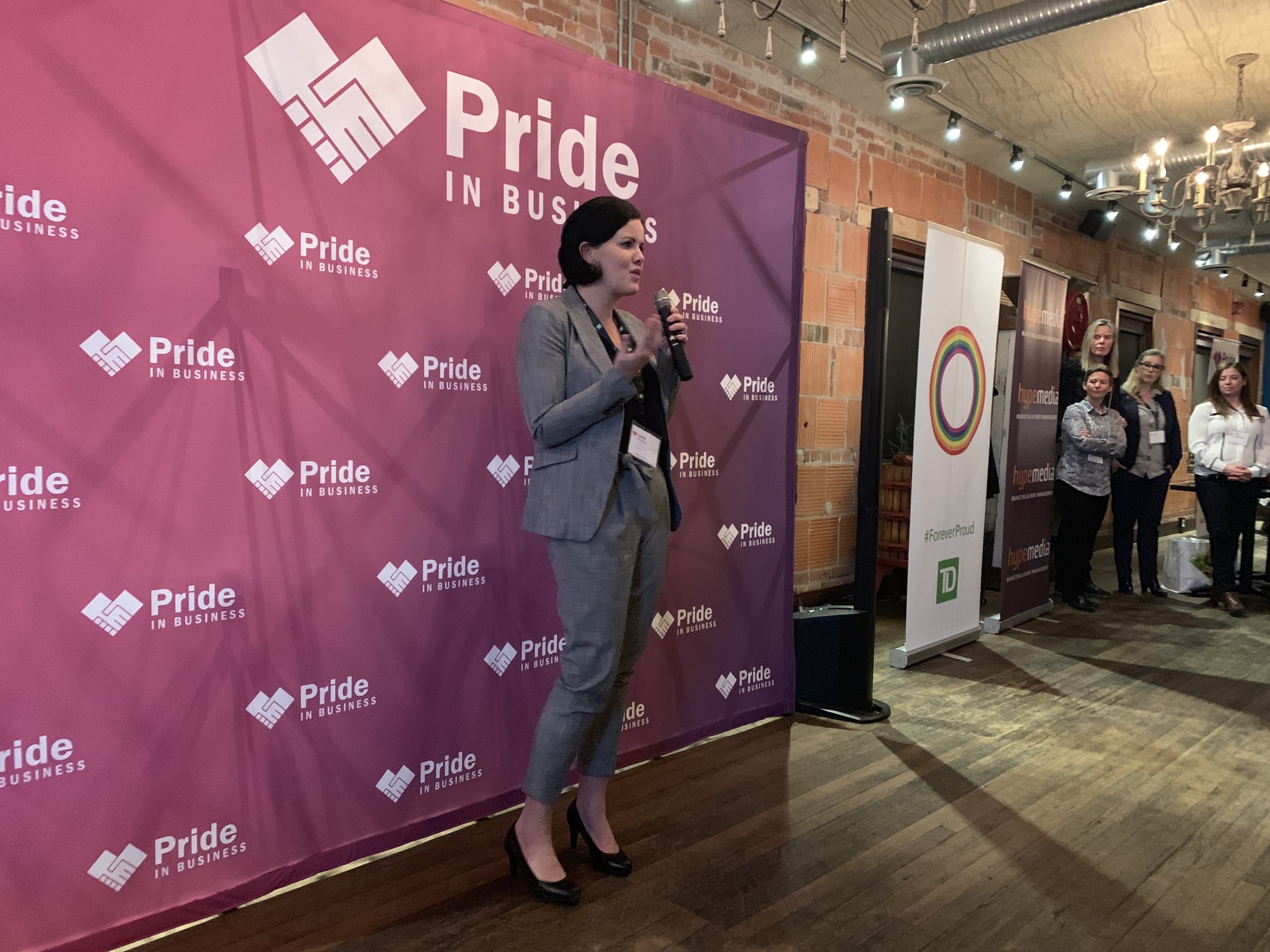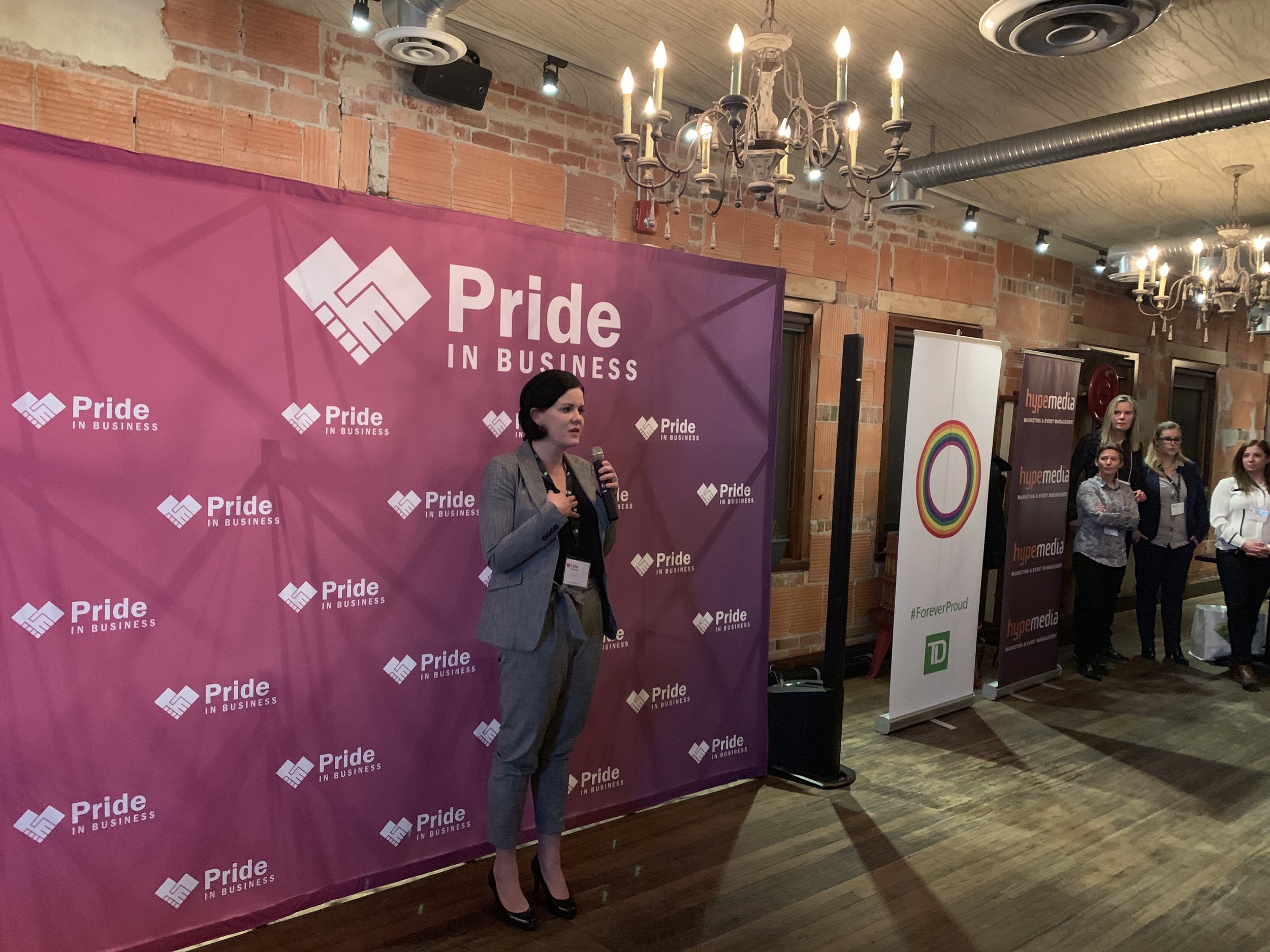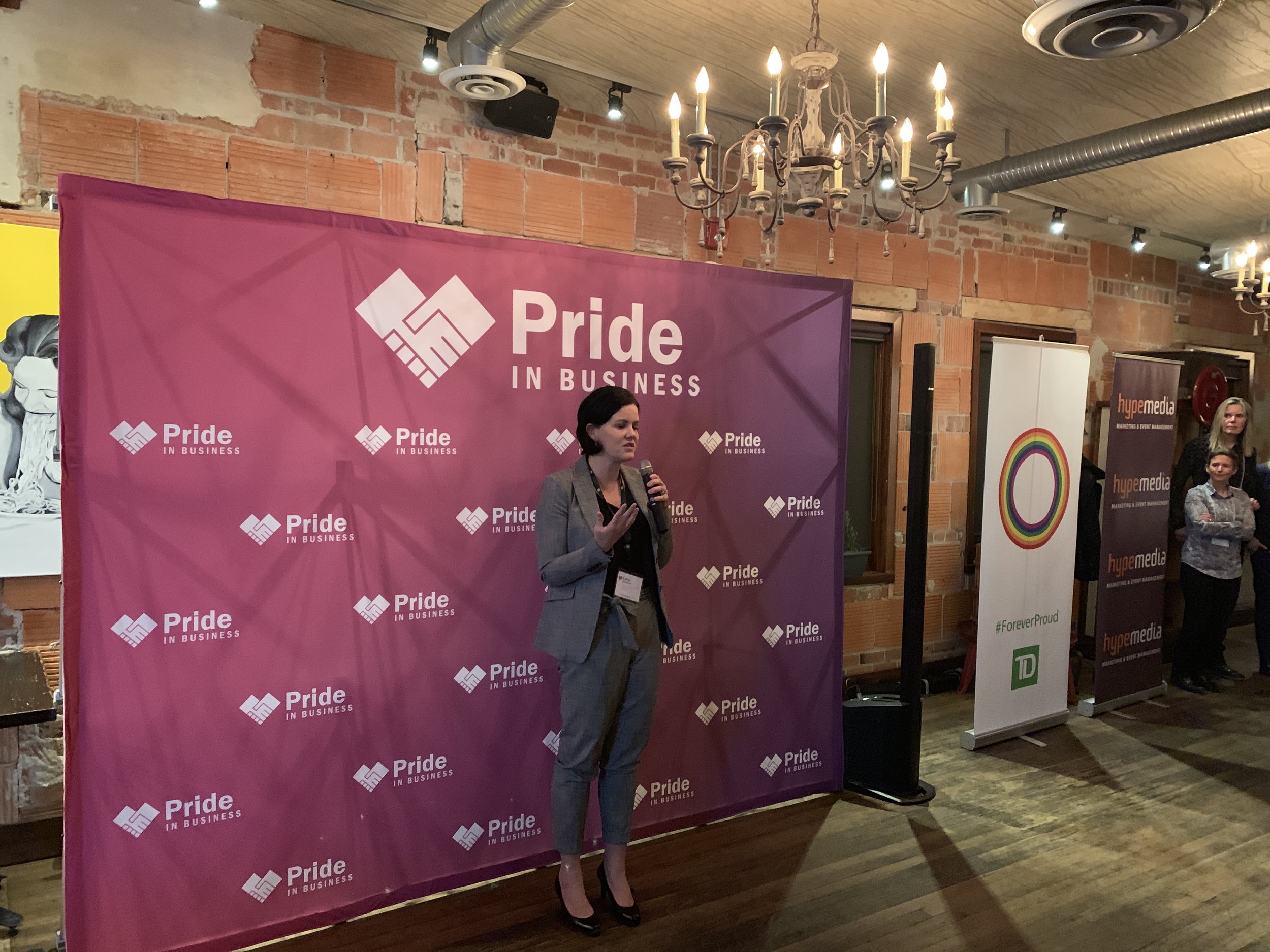Spotlight: Amy Skinner Law
Amy Skinner Law focuses on fertility & life, wills , real estate, and miscellaneous legal services. We talk with Amy Skinner in this Pride In Business Community Spotlight, in partnership with TD.
Q: Tell me about yourself?
I am mostly Calgarian, but I was raised as an ex-pat kid in Indonesia. We returned to Calgary for schooling and I was here until it was time for university, and then I did a cross-country university tour until I ran out of money. I ended up with Law degrees from McGill University. I started articling in Montreal but was recruited for a job in Manhattan. I worked for an airline doing an international codeshare contracts and then with a bank doing international financial transactional work. In many ways they were amazing jobs. Both happened to need someone based in New York, who spoke French, and was trained in both Civil and Common law. That happened to be me. I was there during the financial collapse and the bail out of the bank I was with. It was a wild time to be there.
Q: Tell us about your extended journey through your education and University?
I started at Trent University in Peterborough, Ontario. I graduated with joint Honors degrees in Politics and Economics. While I was there, I started a concurrent degree in Education at Queens University. After my time in Peterborough, I moved to Kingston to finish that degree. Ultimately, I didn’t want to be a teacher, so I applied to graduate programs. I did a Masters of Arts at Simon Fraser University in Burnaby, BC and started a PhD in at UBC. I moved to Montreal to finish my thesis and decided to apply to law school. I didn’t finish the PhD but ended up with Common Law and Civil Law degrees from McGill University.
Q: Did you always know that you wanted to be a lawyer?
Absolutely not. I had no idea where I wanted to go and what I wanted to do with my life. I was moving based on weather, relationships, etc. until I honestly ran out of money and credit. I was looking at being a professor but there were few tenured positions. At a certain point I was teaching a class of law students and started thinking about their job prospects and mine. I was only a few years older than them, so I figured law was a better way to go.
Q: What are your hobbies? How do you spend your time?
I have a 10-month-old infant, so when I am not working, I spend my time with him (my wife is full time parenting). I am also in the Apollo curling league. When he’s a little older I’ll get back to other hobbies.
Q: Tell me about your decision to leave your life in New York and move back to Calgary?
In New York I was doing international commercial contract work with big organizations. It was super interesting, but my marriage was falling apart, and I wanted to move home. I had to start my law career all over again, despite having this experience outside of Canada because of professional regulations and requirements. I needed to do the Bar admission and articling year all over, so I articled in Calgary with a tax and corporate firm. I bought a house in Calgary and my firm did the purchase, but the deal ended up being a disaster. It wasn’t well handled and then it was flooded in the 2013 flood. It was from that experience that I decided to focus on real estate because there had to be a better way. Real Estate conveyancing has become a factory-type method and I want to do things differently. I want to be more hands on, giving more time and respect for (what is usually) a person’s biggest investment.
Q: How long have you been “Amy Skinner Law”?
I am in my third year now and every year is getting busier. My idea was to help people with their big life events such as real estate and fertility. I started my practice right at the on-set of the financial downturn and am just breaking into the industry. In addition to real estate, I am developing a fertility law practice. Real estate and fertility are the fun areas of law and I like to practice them. However, my corporate background has been what has got me through my first few years of business. I have a handful of clients that followed me because they like the work that I do.
Q: Tell me about your different approach? What can you do differently?
I am trying to make law less mystifying. Generally, people’s interactions with the law are intimidating, often negative, and expensive. The common experience is that they go to a lawyer in reaction to some negative event, they are usually scared and don’t quite know what to expect… except that it will be very expensive. I really wanted to make it less scary.
I want to make it easier for people to engage in legal processes and to get information sooner. My preference is to facilitate writing your own rules. I like to arrange things in advance so that there isn’t a fight after. For instance: property agreements, parenting agreements and when people are doing significant things to intertwine their lives. We can set out rules of engagement, so that if things don’t work out, there isn’t a battle at the worst time over how to divide your assets and liabilities. Instead you have already determined these things and had the conversations at a time when you respected and cared for each other. I really encourage people to sort it out upfront. It’s way less expensive than battling in crisis and hurt. I also find that people who do this work up front with their partners seem to last – maybe it’s in part because they can get through difficult conversations.
My approach has been to change the focus, to make law more approachable, and get people to start looking at situations earlier. I am available for people to contact me and say, “I’ve got this situation brewing, what do I have to know about this?”. I made myself available to people much earlier in the process, generally without a fee. I talk to people for a half-an-hour without charging them so they can find out “do I actually have a situation?”, “is this anything substantial?”. Then I can give guidance for a way forward. That said, I am not legal aid and can only give legal information until we become solicitor and client.
Q: Can you talk about what you can do for someone who is thinking about growing a family through the fertility route? It’s a big theme in the LGBTQ+ world.
Since we don’t have the luxury of just accidentally getting pregnant… haha it’s a more methodical process for us. Most of my work has been known sperm donor arrangements. This is generally when a couple arranges a sperm donation from someone they know.
I facilitate understanding between the parties entering the contract because it’s very hard to anticipate how anyone will feel once this small person exists. It’s important to have some tough conversations up front to determine if the arrangement will suit everyone’s wishes. People are also doing all kinds of interesting parenting agreements. In Alberta, you can’t have more than two legal parents, but people can create all sorts of access arrangements.
When it comes to fertility law, I encourage clients to come up with a strategy for how they are going to become a parent, then set up an appointment with me. We can schedule the half-hour free consultation to discuss the idea, discuss legalities and how to make it work. We figure out who else needs to be involved and what are the steps. There are some cool options. There is a lot of flexibility if you arrange it in advance.
Q: How do you feel your business contributes to the LGBTQ+ community in Calgary?
I am really open about being gay, about having a wife and about what our process was in having our own child. As a result, I can relate well and offer my LGBTQ+ clients a comfortable and open atmosphere to work together in. There is a lot of tradition in law that I can manage without my clients having to confront. For instance, language is very gendered and hetero, but I filter that before any of my clients see it, so they never have to explain who their partner is and how they identify. I use gender neutral language and change all precedence, every form I come across to a “they”. I take out all the his, hers, wife, husband, and all the gender specific language so they don’t need to deal with it. Nobody needs a normative gender stance when they walk in here.
Also, my office has a very comfortable atmosphere. It’s not a typically office setting. I answer all the phone calls and emails. I am going to talk directly to my clients. They don’t need to worry about getting through a filter before they can get to me to express their interest and concerns.
Q: What is it like to be in business in Calgary and be a member of the LGBTQ+ community?
I think it’s pretty good. I haven’t had any issues from the community stand point and am working my way in to the networks. My clients come to me by referral, because they know I do good work or because they know the kind of work I do. Straight couples who come in here don’t notice that I use gender neutral language. I think the people who don’t want to deal with a gay person figure it out pretty quickly and they don’t come back… haha. That’s fine because I don’t want to deal with them either.
Q: How can you and your business work as a hub to connect people in our community?
It works really well! Since most of my clients come through referrals, I’ve built up a reliable network of people and professionals. I see a lot of the same professionals and they recommend me to others. That also means that people will call me with a need, and I can connect them with the right person.
Q: Do you have any advice for LGBTQ+ community members who want to go into business for themselves like yourself?
Play by your own rules. Be true to yourself, because you’re not going to be happy if you’re not being yourself.
When I was in New York there was no protection for same sex relationships or orientation. The head hunter who recruited me warned me explicitly to not be ‘out’. At the time I had a business in Montreal which was explicitly a lesbian clothing store. It was located in the Gay Village. I had to take my name off the website and all social postings so I could get this “awesome” job. It was an awesome job… but I never made friends the whole time I was there because I didn’t know who I could trust. I actually got married while I was living in New York and nobody from my work knew. That made me a very difficult person to be around. I couldn’t open-up and I couldn’t trust people I was with. I wasn’t honest with them. I don’t think I could have lasted long there because I never could have networked in a way that could allowed me to progress professionally. I was always caged, and… dishonest frankly. As bad as it was for me personally, it was going to shut me down professionally at some point. So, I do appreciate the experience of needing to be closeted to get a job. I knew when I came to Calgary, I wasn’t going to put up with anything like that and I wasn’t going to work in a place that just ‘tolerated’ me.
It was funny, I got a nose ring when I was 19. I have had a lot of piercings but eventually removed most of them. I put the nose ring back in when I came to Calgary. I used it as a litmus test. When I went for interviews to do my articling year, I steered clear of the firms that made any shaded comments about “looking right for the culture” and “meeting their client’s expectations”. It was always coming back to the nose ring. If the recruiting and interviewing team could not get past an innocuous nose-ring then it certainly was not going to be a place where I could be a comfortable gay person… whatever their marketing was saying about their firm’s culture.
Q: Are you open to being approached from members of our community would who like to connect on topics we discussed in this article?
Yes, certainly 😊. I can be reached through email (Amy@AmySkinnerLaw.ca), phone or Facebook. You can find my information on my website www.AmySkinnerLaw.ca.
Q: Is there anything else you would like to get across in the article?
I am a board member on the Chinook Fund which is an endowment that supports LGBTQ2S+ initiatives in Calgary. Every year there is a series of grants, so please apply! The website is www.CalgaryChinookFund.ca.






